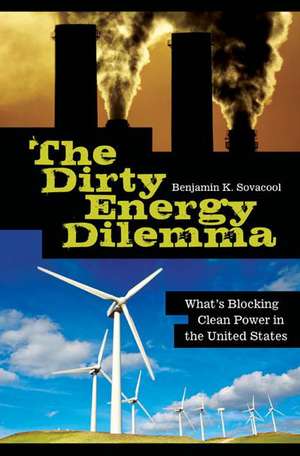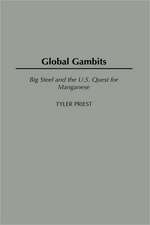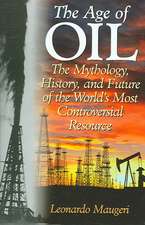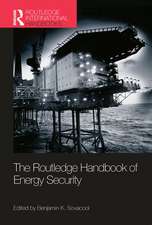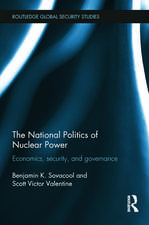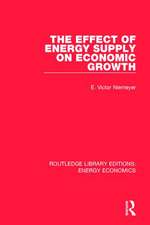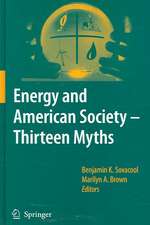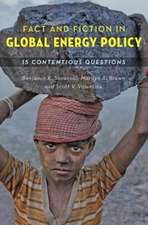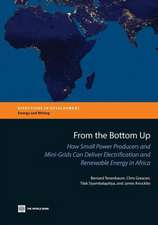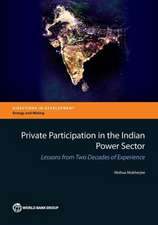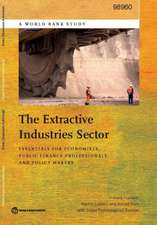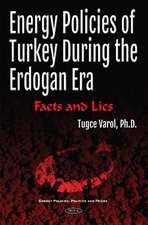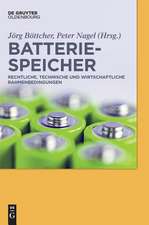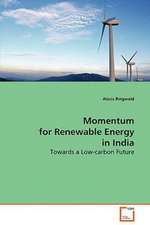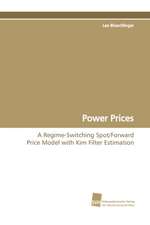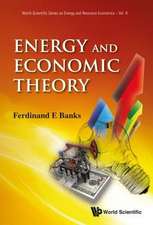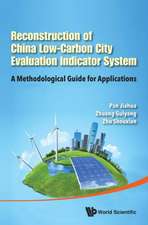The Dirty Energy Dilemma: What's Blocking Clean Power in the United States
Autor Benjamin K. Sovacoolen Limba Engleză Hardback – 29 oct 2008 – vârsta până la 17 ani
Preț: 310.79 lei
Preț vechi: 376.52 lei
-17% Nou
Puncte Express: 466
Preț estimativ în valută:
59.47€ • 62.26$ • 49.21£
59.47€ • 62.26$ • 49.21£
Carte tipărită la comandă
Livrare economică 05-19 aprilie
Preluare comenzi: 021 569.72.76
Specificații
ISBN-13: 9780313355400
ISBN-10: 0313355401
Pagini: 320
Dimensiuni: 156 x 235 x 33 mm
Greutate: 0.64 kg
Editura: Bloomsbury Publishing
Colecția Praeger
Locul publicării:New York, United States
ISBN-10: 0313355401
Pagini: 320
Dimensiuni: 156 x 235 x 33 mm
Greutate: 0.64 kg
Editura: Bloomsbury Publishing
Colecția Praeger
Locul publicării:New York, United States
Notă biografică
Benjamin K. Sovacool is Research Fellow in the Energy Governance Program at the Centre on Asia and Globalization in the Lee Kuan Yew School of Public Policy at the National University of Singapore. He is Adjunct Assistant Professor in the Government and International Affairs Program at Virginia Polytechnic Institute. He investigated the social impediments to renewable energy systems for the NSF Electric Power Networks Efficiency and Security Program. He has worked in advisory and research capacities at Oak Ridge National Laboratory, the New York State Energy Research and Development Authority, the Virginia Center for Coal and Energy Research, and the U.S. Department of Energy's Climate Change Technology Program. He is the co-editor with Marilyn A. Brown of Energy and American Society: Thirteen Myths (2007) and a frequent contributor to such journals as Electricity Journal, Energy Policy, Stanford Environmental Law Journal, and Daedalus.
Cuprins
PrefaceIntroductionChapter OneThe Big Four Energy ChallengesChapter TwoThe Big Four Clean SolutionsChapter ThreeFinancial and Market ImpedimentsChapter FourPolitical and Regulatory ObstaclesChapter FiveCultural and Behavioral BarriersChapter SixAesthetic and Environmental ChallengesChapter SevenThe Big Four Policy MechanismsChapter EightConclusions
Recenzii
Conventional energy sources are low-cost but dirty, finite, and prone to price volatility, while clean energy is sustainable and reduces air pollution and emissions of greenhouse gases. However, clean energy is more expensive, demands difficult changes from both consumers and suppliers, and results in environmental disruption, so how do we embark on a cleaner, more sustainable energy path? Sovacool (Energy Governance Program, National Univ. of Singapore) solves this 'energy dilemma' by dismissing it. He argues that the negative aspects of clean energy are best ignored, even if doing so requires a federal mandate compelling utilities to purchase more expensive clean energy and forces energy consumers to pay a 'benefit charge' to finance their own reeducation by funding programs that promise to reduce consumers' aesthetic and environmental objections to clean power.
When advocates of the conventional electric industry dismiss alternatives to fossil fuels and nuclear technology as immature, inefficient, and risky, says Sovacool (energy governance, National U. of Singapore), they are lying. He identifies the impediment to adopting them not as technological challenges, but social, cultural, economics, and political interests. He looks at financial and market impediments, political and regulatory obstacles, cultural and behavioral barriers, and aesthetic and environmental challenges.
.[A] gem of an analysis pertaining to the energy industry in the United States.[A] superb piece of work.
.the book is not light reading, but is important reading for anyone with serious interest in national and global energy issues. .Although I may not agree with Sovacool on all points, his work is informative, interesting and compelling in logic. Without question, The Dirty Energy Dilemma provides some very serious food for thought. I would add it to the required reading list for all energy policymakers.
Grappling with a topic that too many find boring, Sovacool ignites new passion to conserve energy, experiment with alternatives to fossil fuels, while seeking independence from suppliers who resent their customers along with a grid that's antiquated and burdensome. Obama's inaugural address offers hope that the time has come for the US to recognize that self-restraint can produce more freedom and happiness than excess, and Sovacool's book joins a rallying cry that marks the end of an era of so much wasted potential.
When advocates of the conventional electric industry dismiss alternatives to fossil fuels and nuclear technology as immature, inefficient, and risky, says Sovacool (energy governance, National U. of Singapore), they are lying. He identifies the impediment to adopting them not as technological challenges, but social, cultural, economics, and political interests. He looks at financial and market impediments, political and regulatory obstacles, cultural and behavioral barriers, and aesthetic and environmental challenges.
.[A] gem of an analysis pertaining to the energy industry in the United States.[A] superb piece of work.
.the book is not light reading, but is important reading for anyone with serious interest in national and global energy issues. .Although I may not agree with Sovacool on all points, his work is informative, interesting and compelling in logic. Without question, The Dirty Energy Dilemma provides some very serious food for thought. I would add it to the required reading list for all energy policymakers.
Grappling with a topic that too many find boring, Sovacool ignites new passion to conserve energy, experiment with alternatives to fossil fuels, while seeking independence from suppliers who resent their customers along with a grid that's antiquated and burdensome. Obama's inaugural address offers hope that the time has come for the US to recognize that self-restraint can produce more freedom and happiness than excess, and Sovacool's book joins a rallying cry that marks the end of an era of so much wasted potential.
